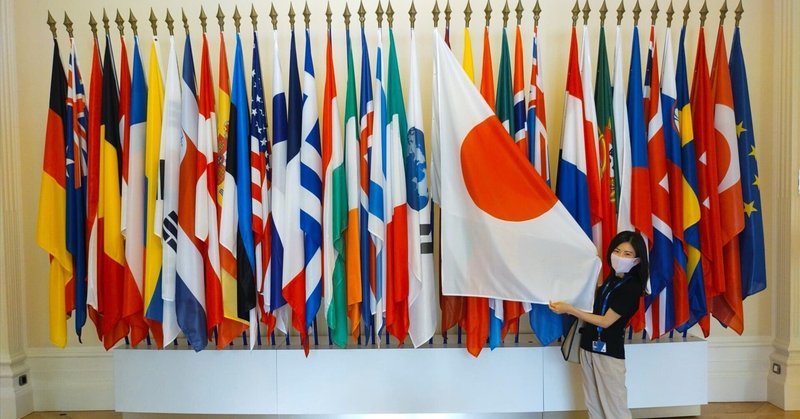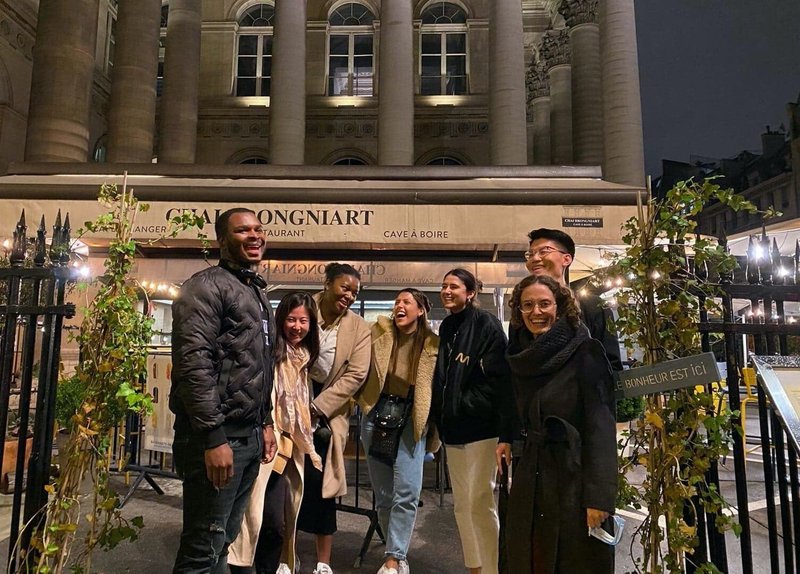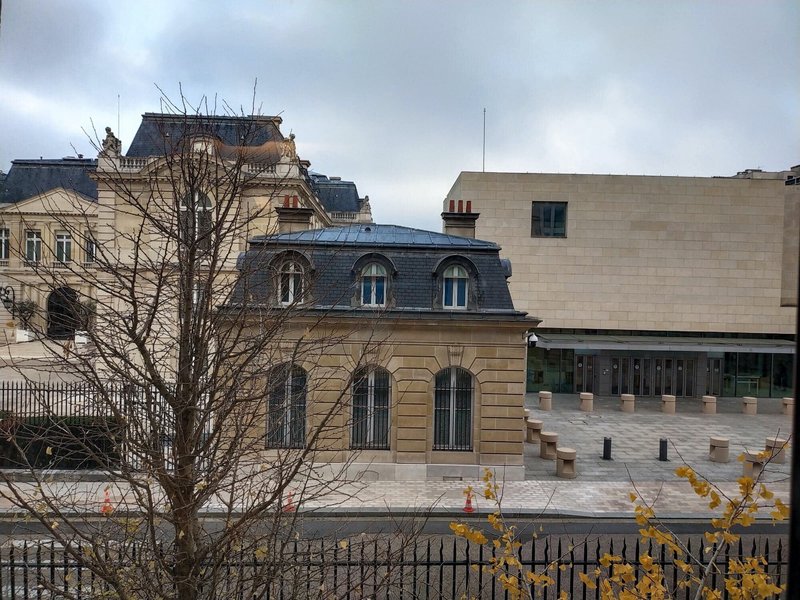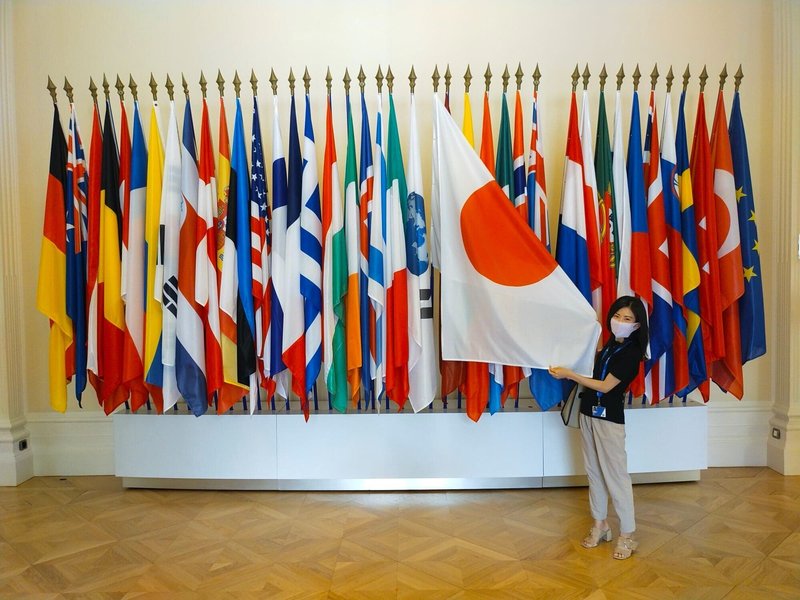
Luna at IÉSEG -Study abroad will never make you regret! 留学は絶対自分を後悔させない!-
This post focuses on the story of Luna, who had recently studied in Paris, France. How did this study abroad experience change her from a person with low self-esteem into somebody who rediscovers herself and dives into a new career? Just read through it to know more!
さて、少し間が空いてしまいましたが今回はフランス・パリについ最近まで留学されていたLunaさんの体験記です。自己肯定感の低かったという彼女が、渡仏を経てどのように自らを再発見し、そして新たなキャリアに向かって羽ばたいておられるのか、是非読んでくださーい!
(前回のFujibowさんのサンノゼ勤務談はこちら)
1. 留学前期 〜「フランスにいつか住みたい」夢を叶えるために〜
(Hiro) まず初めに、留学時期と留学先を教えてください!
(Luna)留学期間は2020年8月-2022年2月で、留学先はフランス・パリにあるIÉSEGに行っていました。実際には卒業は4月末に論文を提出した所でになります。全体のプログラムのうち、1年目はコースワークで、2年目が必修となっているインターン(概ね4~6ヶ月)とに充てられました(自分の場合は、後述するOECDでインターン)。フランスはどちらかと言えば、1年より1年半~2年のプログラムが多い印象ですね。
(Hiro) Why don't we start with when and where you studied abroad?
(Luna) I studied at IÉSEG from August 2020 to February 2022. My actual commencement was the end of April 2022, when I submitted my dissertation. The programme was mainly divided into courseworks in the first year and internship (some four to six months) plus thesis preparation in the second which is also required (as for me, I had an internship at OECD, which will be detailed later). I have an impression that there are more 1.5-/two-year programmes than one-year in France.
(Hiro) そもそも留学をすると決心したキッカケは何があったのでしょうか?
(Luna)フランス映画にはまって、大学に入ってからフランス語を学ぶと決意したのが高校時代でした。在学中に語学学校に一回行ったのですが、その時に「いつか長く住んでみたい」という目標ができ、留学を目指して準備していたのが大学~社会人です。ただ大学時代は、研究室に入ったら電力工学の研究に没頭してしまったので行く機会がなかったんです。それで入社した時から、社会人留学制度があったのでそれを使わない手はないと思っていました。巡り巡って、まさに「夢が叶った」ということですね。
(Hiro) What brought you there?
(Luna) I got so absorbed in French movies that I decided to study French at college after graduation from high school. I also once went to a language school at the age of 21. The goal then changed to "someday I wanna live in France," but I did not take a chance as a college student because I was into studying electrical engineering. So after starting to work, I felt like there is no way but to use the study abroad system sponsored by the organisation. Literally my dream came true, although after going through some back and forth.
(Hiro) 出願先の選び方や、準備(テストやエッセー等)で苦労されたことなどあれば教えてください。
(Luna)最初はフランス語での出願も検討していたのですが、中途半端な学習ではフランス語が十分に伸びなかったため、英語での志願に切り替えました。そうすると、今度はTOEFL対策に苦戦。Speaking, Listening, Writing, Readingを満遍なく対策しました。Readingはhiroさんのブログでも触れられているandy先生の対策本で勉強、SpeakingはE4TGに、WritingもY.E.Sという上野の塾に行きましたが、そこがListeningも鍛えられてすごく良かったです。最初は72点(社内選考に応募する前)でしたが、最終的にはその翌年の秋(9月頭)に99点まで上げました。
余談ですが、欧州での英語、OECDも含めて、使われていたのはイギリス英語です。
(Hiro) Please share how you decided on where to apply and how you prepared for tests, essay, etc.!
(Luna) Although considered applying in French at first, I realised that my French ability had not improved as expected, partly because of my insufficient effort, I switched to applying in English. After then, I felt so much pain in preparing for TOEFL. I spent time almost evenly in Speaking, Listening, Writing, and Reading sections. As for reading, I tackled books provided at the study session that Andy-sensei held, which you also attended. , small prep E4TG for speaking, and Y.E.S at Ueno for writing, where I also improved listening. My score went up from 72 (right before taking the selection within the org) to 99 (next year's September). Very trivial, but in Europe British English was prevalent inc. OECD.
(Hiro) 学校選びについてはどうでしたか?
(Luna) 学校選びも苦戦しましたねー。そもそもフランス国内の大学院で、英語で授業を行うところが多くないので、それをまず10校見つけて、出願したのは5校でした。エッセイはコンサルに頼んでいるという方も多いと思いますが、私は頼まず自作し、知人に読んでフィードバックをもらうことをひたすら繰り返しました。
(Hiro) 最終的に、IÉSEGにしたのは何が決め手になったのでしょうか?
(Luna)別の大学にも行こうとしていたのですが、コロナ禍の留学でもオンライン環境が整備されどんな形でも授業を受けられること、パリなら知り合いがいて安心だったから、といった生活面も含めたいくつかの要素が噛み合わさって決めました。
(Hiro) How about school choice?
(Luna) Not an easy thing, here are not so many grad schools in France where courses are taught in English. I first found ten, and applied to five of them. Unlike other people who asked consultants for help with essays, I made them by myself and kept receiving feedback from those who I know very well.
(Hiro) Why IÉSEG?
(Luna) Not only just because I got an offer, but also because of the equipment for hybrid lectures during the pandemic, and the location as well made me feel more comfortable since some of my friends are in Paris. Although I once considered studying at another one, a mixture of study and life factors pushed my back.
2. IÉSEGとの出会い 〜新設専攻でビジネス戦略からソフトスキルまで〜
(Hiro) では次に、どのようなプログラム、コースを履修したのか教えていただけますか?
(Luna)International Business and Technology、国際ビジネスマネジメント専攻といって、日本の商学部にマネジメントがついたイメージです。実はこの学部は新設専攻で、国内外ビジネスの戦略理論や金融知識などを学び、昨今課題となっているAIの導入やESG (Environmental, Social, and Governance)などを踏まえ、企業に変革を起こすための組織・リソースマネジメントを学べるようになっていました。ただ同じ内容のコースがあったり、新設であるが故に慣れていない部分もありました。そこで、3ヶ月に一度くらいアンケートを踏まえて直接学生の声を聞く機会があり、大学の学部の授業のあり方について大学側とディスカッションしたりする経験もしました。そうした意見を授業を受けている側として直接伝えられるというのは新鮮でしたね。
(Hiro) Makes sense. Then could you elaborate on your degree programme next?
(Luna) The programme was International Business and Technology, which added management on the department of commerce to my understanding. As a newly launched programme, we are supposed to study theory of business strategy inside and outside France and knowledge on finance, as well as organisational and resource management in order to transform corporations based on contemporary issues such as the adoption of AI and ESG (Environmental, Social, and Governance). However, there is some room for improvement - contents of some courses overlap with each other, for example -, so once in every three months, the university sets up an opportunity where they directly hear voices from students based on the result of a questionnaire. To me it was something very new to convey my thoughts to those who are in charge of the programme and have a dialogue on the way grad school ought to be.
(Hiro) 学生のバックグラウンドはどうなっていたのでしょうか?
(Luna) 学生は全部で9人でした。そのうち、国でいうと中国人、シンガポールに行っていた中国人、スペイン人、イギリス人、ブラジル人、コロンビア人、アフリカのナイジェリア出身、コートジボワール出身。私を含め社会人経験のある人が3人、就職はしていないがインターンをしていたのが3名、純粋な学部生が3名といった内訳でしたね。
必修としてはフランス語、経済、社会科学的な科目の他は、ソフトスキルやSPSS、ビッグデータ解析のツールの学習などがありました。2学期制になっていて、他にはファイナンス、国際経済、イノベーションマネジメント、人材マネジメント、組織改革、交渉など。1学期は知識系を学び、その後、2学期ではソフトスキルや組織変革などを中心に学ぶといった流れでした。現在流行りのEmergent Technology、最先端技術にはどのようなものがあるか、それらが世界にどのような影響を及ぼすのかといったことも学びました。
(Hiro) What about student demographics?
(Luna) There were nine students in total - a Chinese, also a Chinese who was once in Singapore, a Spanish, a British, a Brazilian, a Columbian, a Nigerian, and one from Cote d'Ivoire. Three of us, including me, had a working experience, three had an internship experience, and the remaining three directly came from an undergrad.
We took such core courses as French, econ, social science, soft skills, SPSS, tools for big data analysis, in addition to finance, international economy, innovation management, human resource management, organisational reform, and negotiation. The typical pattern is that you take courses mainly relating to knowledge in the first term and then move onto those on soft skills and organisational transformation in the second. Also learned what kinds of emergent technologies are existent, and how they have an impact on the society.

(Hiro) 特に印象に残っているクラスがあれば、紹介していただけますか?
(Luna)リーダーシップ論や人材マネジメントを授業で体系的に学べるということ自体が社会人からして驚きでした。これは日本の全社会人が学ぶべき「必須科目」だと思いましたね。
具体的には、リーダーシップについては特徴的なパターンが色々あるということで、ヒトラーからナイチンゲールまで様々なケースを通じてそれを分析しました。リーダーシップは特質みたいなものであり、自分はどういうタイプか、色々なタイプの中から考えてみることも出来ました。1つの正解がある訳ではないので、多様性があることが大切だと感じましたね。ブルドーザーみたいな強引に突き進んでいく人がリーダーかと言うと必ずしもそうでもないし、メンバーと状況に応じてどういうリーダーシップ行動を発揮するのかを考えるのが重要だと学びました。
(Hiro) 仰っている話は、効果的なリーダーシップは場面に応じて異なるという、contingency leadershipに近いお話かもしれませんね。
(Luna) 人材マネジメントについても、集団の中にはモチベーションのない人から仕事をやりすぎてしまう人まで様々いて、大別すると9つのパターンに分けられると。そうなると、そうした個の集まりであるチーム全体としてどう動いていくのかということを考えないといけない。人間ってロボットではなく生身なので、その時のメンバーの考え方、価値観次第でどうなるか変わる、つまり人をみないとどんな仕事も結果を出せないということですね。directorだけではなくsection chiefレベルでも、またカリスマ性がなくても、任せてくれていればその人はリーダーとも言えます。個々人が色んな働き方をしているその多様性を理解した上で、考える必要があるということを体感したことが大きな学びでした。他にも国連で交渉を実際に担当していた教授の授業で、相手がアグレッシブな交渉をしてきた場合に自分はどう対処するかといった実践面についても学びましたね。
(Hiro) Could you share a little bit about classes that struck you?
(Luna) First of all, it was a surprise to me that leadership and HR management can be learned in a systematical way. I believe that they should be "core courses" to all Japanese professionals. In particular, we analysed a variety of cases (e.g. Hitler, Nightingale) with the lens of specific leadership patterns. Leadership is almost an attribute, which I could apply to myself. There is not "right" way of exercising leadership, and I felt diversity in terms of leadership behavior is important. Someone going forward like a bulldozer is not always an appropriate leader - my takeaway is that pondering upon what kinds of leadership behaviors are effective depending on team members as well as situation is indispensable.
(Hiro) In my sharrow understanding, what you have just said is close to the theory of contingency leadership.
(Luna) As for HR management, there are people with diverse attitude toward work: from those who have little motivation to those who are too into it. They are roughly catergorised into nine patterns, and we should pay attention to how we as a team would move things forward. Humans are not robots, so our performance as a team depends on ways of thinking as well as values of team members. That brought home to me that our efforts would never be rewarded without giving heed to people. Leader does not equate with position, so both a director and a section chief can be a leader. Also, someone who does not have any sort of charisma but can trust and delegate to others can be considered to be a leader. It was a great lesson to me through this learning experience that I need to continue to think about what is a desirable leader with diversity of ways of working in mind. Another impressive course was that of negotiation, in which a professor who was once in charge of negotiation at UN shared practices on how to coping with your counterpart who negotiates very aggressively.
(Hiro) 授業以外ではどのような活動をされていたのでしょうか?
(Luna)せっかくパリに住んでいたので、まずはフランス語学習でした。学校のフランス語の授業がいまいちだったので、語学学校に行って、オンラインと対面で併用して勉強していました。ただ特にロックダウン中は引きこもりがちになり、レッスンも基本オンラインでした。ロックダウンが解除されてからは、リフレッシュのために運動(バレエ)をしたりしていましたね。
(Hiro) What kinds of activities were you engaged in during your stay there?
(Luna) I first made up my mind to study French, for I was in Paris. The French course offered by the school was not so excellent, so I went to a language school (a hybrid of online and face-to-face lesson). However, especially during lockdown, I spent almost all of my time at home and attended lessons remotely. After it was lifted off, I practiced ballet as a pastime.
3. OECDでのインターンシップ 〜脱炭素のデータベース構築〜
(Hiro) 確かにコロナ禍での生活は大変でしたよね・・・では、冒頭もお話いただいたインターンについて詳しく教えていただけますか?
(Luna) インターンシップはOECD(経済開発協力機構)で、脱炭素系のサイエンスのデータベースを構築する業務に従事しました。元々自分がレジュメ(CV)を作って送り、また知人にも推薦状を書いていただいたところ、先方もこれらを見て求めている人材のニーズにぴったりだと思ってくれたようで、後からお話するようにインターン探しには苦労していたのですが、ここでは幸いにもオファーをいただくことができました。
具体的な内容としては、既存の各国のSTI(科学技術イノベーション)政策に関するOECDデータベースの番外編として、脱炭素系のものをピックアップして統合し、文字や数字のデータセットの羅列ではなく、グラフ等ビジュアルで魅せるためのポータルサイトを構築するというプロジェクトでした。実際のものはこちらからご覧になれます。
https://stip.oecd.org/stip/net-zero-portal
(Hiro) 中々面白そうなプロジェクトですね!その中で印象に残ったことや苦労されたことはありますか?
(Luna) このポータルはOECDとIEA(国際エネルギー機関)とのコラボレーションになるのですが、両者にとっては初めての連携成果物でした。というのも、IEAはエネルギーという軸であるのに対して、OECDは科学技術という軸なので、合意形成は簡単ではないんです。たとえば、IEAとしては、「CO2を排出する石炭を使うことは悪」というメッセージを発信する立場、一方、OECDのようなサイエンスのコミュニティとしては「石炭火力の効率向上も環境への貢献ではないか」と言えてしまう。言い換えれば、お互いの所属するコミュニティでのニーズは必ずしも一致しない。その中で私が間に立って両者の妥協点を調整させてもらいました。いきなりハイレベル同士だと中々率直な会話はしづらいので、まずは自分の担当レベルでの綿密なコミュニケーションを取ることにチャレンジしました。時間はかかりましたが、「脱炭素の科学技術政策」の基準の定義を含めて、企画・設計・調整の中心的な役割を果たすことができたのは、大きな自信になりました。
(Hiro) Can imagine how hard it was... then can we move onto your internship experience?
(Luna) I was engaged in establishing database for science, especially decarbonisation, at the OECD (Organisation for Economic Co-operation and Development). I emailed my CV coupled with a letter of recommendation, they seemed to think that this is a good match for them too. Despite my overall strugglle to get an internship, they kindly gave me a offer. Specifically, this project was to establish a thematic portal with a focus on decarbonisation by integrating an existing database of STI (Science and Technology Innovation) and show data visually with graphs and charts linked to database. You can see the actual database from here.re.
https://stip.oecd.org/stip/net-zero-portal
(Hiro) Sounds super interesting! Anything you wanna add on regarding this project?
(Luna) This portal is a culmination of the first-time collaboration bet the OECD and the IEA (International Energy Association). Buiding a consensus there is not an easy thing since the IEA has a focus on energy while we focus on science and technology. This means the IEA would say using coal is evil as it emits CO2 while the OECD as a science community would argue raising the effectiviness of buring coal could contribute to environment, for instance. In other words, our interests do not correspond with one another, and this is where I stepped in to strike a point of compromise. I strived to build a relationship by frequent communication, for frank discussion rarely happens among those high-rank professionals. Although it was time consuming, I took an initiative in planning, devising, and coordinating, including defining "STI policy for decarbonisation," which also raised my self-confidence.
4. 留学中の成長 〜失敗が怖かった自分が失敗に動じなくなった〜
(Hiro) 留学中に苦労していたことを、勉強面でもそれ以外でもあれば教えてください!
(Luna)友達作りは苦労しましたね。コロナ禍なこともあったのと、新設なので他の大学院のように卒業生とのつながりもありません。だから、学外の語学学校やバレエクラスに通ってこれまでフランスで知り合った人とは全く異なる職業・国籍の人が集まる環境に身を置くことができたのはすごく幸せだったし、コロナ禍でもOECDで同僚に会う機会に恵まれたのはよかったです。
それと、インターンシップ探しでは中々受からないという苦難に直面しました。学校のキャリアフェアに参加したりしていたのですが、「フランス語喋れないとインターンを見つけるのは難しいよ」と言われながら、大学からのそこのサポートが手薄だったり・・・民間含めて10社くらいエントリーしたのですが、全然ダメでした。クラスメートは、100社エントリーして面接に進んだのが10社、結果はゼロだったり。このようにそもそもインターンを見つけられないと卒業できないのですが、ぎりぎりまで決まらず苦労している同級生も大変いた。学校としてのサポートも不足していた気がしますね。
(Hiro) Any painful experience inside or outside school?
(Luna) It was hard to make friends to me. Also because of the covid, and there was no connection to alumni as this school was new. Therefore, it was such a wonderful experience to meet at language school or ballet class totally different people in terms of career and nationality from those who I spent time with at my grad school. Also appreciate working with my colleague at OECD during the pandemic.
Moreover, I had a hard time looking for my internship. The school staff advised me that it would be difficult to get an internship without being fluent in French at a career fair, but they did not provide enough support. I appied to ten or more companies, which ended up being unsuccessful. One of my classmates even applied to one hundred, moved onto an interview with ten of then, and got no offer. As I mentioned above, internship is part of our degree programme, so we cannot graduate without finishing it. But many of us had a struggle, and support from the school was apparently insufficient I would say.
(Hiro) コロナ禍でのフランス生活となったわけですが、その中で感じたことなど是非教えてください。
(Luna)フランスに住むことが目標なので、ロックダウンであっても夢は叶っている!と思い、日々の生活(マルシェに買い出しに行く、美味しいパン屋をめぐる、街の建築を眺める・・・)だけで十分幸せに感じました。とはいえ、人と会えないのは、単身者としてはなかなか辛かったですね。旅行はロックダウンが明けた後、夏休みや週末に国内各地を回りました。
(Hiro) Could you share your feelings on your life in France during the pandemic?
(Luna) As I said, living in France was my dream. So I appreciate everyday life (going shopping, visiting around bread shops, looking at architecture...), while talking to myself, "my dream has come true, although it's in the midst of lockdown!." But at the same time, I as a single felt somewhat lonely as I could not hang out with friends so frequently. After it was lifted off, I traveled to many places in France during summer and weekends.

(Hiro) 留学先で身に付けた、あるいは気付いた自らの強みはありましたか?
(Luna)CVを作っている中で、環境エネルギーとか自分の興味関心のあるトピックが自分のキャリアのコアになっていることに改めて気付かされたんです。また、ソフトスキルにもこれまで見えていなかった、自分らしさを見出すことができました。具体的なエピソードとしては、大学院でクラス代表を決めるのが最初にあったのですが、投票になってなぜか私になったんですよ!手前味噌ですが、冷静に皆の意見を聞き、サポートしようとするところが評価されたのかもしれません。(英語がうまく喋れなかっただけなのですが!笑)一年後、クラスメートから「Lunaで良かったよ」と言われたことが嬉しかったです。小さな気遣いのようなささいなことでも、個性が役立つことを実感し、自信になりました。
それと、海外の強気な人たち(一部ですが笑)をみて、自分も失敗に動じなくなりましたね。人種関係なく人の個性ってこういうことなんだと。渡仏する前は自己肯定感が低いというか、人の目を気にするというか、ダメと思われたくないというプライドがあったことは事実でした。子供の時から失敗するのが嫌で、できないことが怖い、負けたくないということがあったのですが、留学に行くことによって、「ダメでもともと、最悪寝っ転がればいいからやってみよう(笑)」といった心づもりで躊躇しなくなったことは、経験を積み重ねるためにも大きかったです。
(Hiro) Did you acquire or find your new strengths?
(Luna) While creating my CV, I found that my areas of interest such as environment and energy are the core of my career. Additionally, I noticed the uniquess of my soft skills, which I had not been aware of before my study abroad. There is an interesting episode - at the beginning of the semester, we had to decide on student representative, and I was selected as a result of a vote! My attitude to try to listen to everyone and provide support might have been appreciated by my classmates I think. Because I was not good at speaking in English haha. One year later, one of my classmates thanked me for being a representative, which I myself took as a praise. However trifle, my personality helped those around me, which again gave me a bit of courage. Furthermore, I became less subject to failure as I spent time with people who never give up (not all of them). This reminds me of what personalities are, regardless of their backgrounds. I had to confess that before leaving Japan, I had little self-esteem, cared too much about how people thought of me, and tried to avoid looking incompetent. Since I was a child, I did not like making mistakes, was afraid of it, and did not want to lose. However, study abroad made me less hesitant, with a resolution that "failure is a natural part of life, so just try it and lie down in the worst case." This mindset change is very crucial.
5. そして転職へ 〜個として働くために自分に必要な学びと経験を獲りにいきたい〜
(Hiro) そして留学後にキャリアチェンジをされたとのことですが、その際の思い、迷いなどを可能な範囲で教えてください!
(Luna)組織や国籍で決めるのではなく、個性や専門性を生かしたキャリアを常に選択する人々に出会い、「生きる場所は自分で選択すべき、組織の一部ではなく、個として働くために自分に必要な学びと経験を獲りにいきたい」と思ったら、必然的に組織を変えるほかなかった、ということでしょうか。
仕事でお世話になった方々や、これまで励ましてきた後輩には申し訳ない気持ちもあったのですが、「情で働くのではなく、できるスキルをもって貢献するのが恩返し」と思って、決断しました。前職は誇りに思える仕事でしたし、全く知らない場所に行くのとどちらが後悔するのかと思ってしまうと不安ではありました。自分のスペックを磨きながら、置かれた環境で頑張る選択肢もあれば、環境を変えることも相まって、自己実現に向かうという道もあります。自分は後者を取りました。
(Hiro) And I heard that you changed your career after then. What brought you there, and any thoughts on that?
(Luna) It was almost natural for me, for I thought "I should choose by myself where I live. I would like to get learning and experience necessary for working as an individual rather than a part of an organisation." This is because I encountered those who chose their career by their personalities and specialties rather than organisation or nationality. I felt sorry for my previous colleagues, but I believed that rather than continuing my current career out of compassion, I should contribute to the society with my skills, which would in turn reward them. I loved my previous workplace, and to be honest, I felt kind of uneasy - that I might regret leaving there and diving into somewhere tottaly new to me. There are many paths to take - building on what you achieved while acquring new skills or changing your career environment - for your self-actualisation. I took the latter choice.

6. 読者へのメッセージ 〜不安がある人は、選択肢を作ってから悩んだらいい〜
(Hiro) 確かに人それぞれの道があって良いですよね。私もLunaさんのチャレンジを応援したいと思います。それでは最後に、留学を考えているor迷っている方へのメッセージをお願いします!
(Luna) 向き不向きはあると思いますが、すこしでも心がそれを望むなら留学経験は絶対自分を後悔させないと思います。不安がある人は、選択肢を作ってから悩んだらいい。私のようにとりあえず不安に目を背けて準備してみると、気づいたら渡航日になってると思います。人生、ノリと勢いですよ!その先に見えていなかった何かが見えて来るはずです。
(Hiro) Every person is different - so is their career path. I myself support your decision! Then last but not least, please share your message to those who consider but cannot take a step toward study abroad!
(Luna) Study abroad will never make you regret if even a tiny part of your mind desires, although there is an issue of goodness of fit. If you feel uneasy, just create options and then live with your anxiety. If you prepare for your future while looking away from your uneasiness, just like me, the day 1 of study abroad will approach just in front of you. Life is life, sometimes easygoing... you can see something that you have never seen beyond it.
この記事が気に入ったらサポートをしてみませんか?
